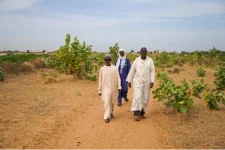A big American company promised to transform a massive chunk of Senegalese land into a thriving agricultural project. They talked about creating thousands of jobs and growing alfalfa for export to wealthy Middle Eastern countries. Rusted pipes and angry workers are all that remain from their grand plans. The project turned into a massive disappointment for local communities who had hoped for economic opportunities. Investors Frank Timis and Gora Seck swept into the village of Niéti Yone with big dreams.
The company African Agriculture secured a huge 50,000-hectare land lease near Senegal's largest freshwater lake. Residents were divided about the project; some saw potential jobs, while herders worried about losing traditional grazing areas. About 70 community members got hired for the initial work. The company planted a small 300-hectare test plot of alfalfa and went public on the NASDAQ exchange. They raised $22.6 million but had to pay $19 million to merge with another company.
Workers like Doudou Ndiaye Mboup believed the project would solve unemployment problems. He took a job as an electrician and saw hope for young Africans. However, the dream quickly fell apart. Workers stopped receiving paychecks and struggled to support their families. Mboup had to sell his motorbike and sheep just to feed his children.
The land now sits abandoned, with security guards preventing local herders and farmers from accessing their traditional spaces. Community members filed legal actions to recover unpaid wages totaling around $180,000. Some workers protested outside the company's office, burning tires to draw attention to their plight. The project exposed how foreign investment deals can harm local communities. Experts found that only 11% of such land deals ever return to original community use.
The former CEO Alan Kessler moved on to another massive land project in Congo and Cameroon. His new company, African Food Security, seeks $875 million in investment. Experts remain skeptical about the grand claims of food production and job creation. The story highlights ongoing challenges with foreign agricultural investments in Africa. Local communities continue fighting to protect their lands and livelihoods.
The company African Agriculture secured a huge 50,000-hectare land lease near Senegal's largest freshwater lake. Residents were divided about the project; some saw potential jobs, while herders worried about losing traditional grazing areas. About 70 community members got hired for the initial work. The company planted a small 300-hectare test plot of alfalfa and went public on the NASDAQ exchange. They raised $22.6 million but had to pay $19 million to merge with another company.
Workers like Doudou Ndiaye Mboup believed the project would solve unemployment problems. He took a job as an electrician and saw hope for young Africans. However, the dream quickly fell apart. Workers stopped receiving paychecks and struggled to support their families. Mboup had to sell his motorbike and sheep just to feed his children.
The land now sits abandoned, with security guards preventing local herders and farmers from accessing their traditional spaces. Community members filed legal actions to recover unpaid wages totaling around $180,000. Some workers protested outside the company's office, burning tires to draw attention to their plight. The project exposed how foreign investment deals can harm local communities. Experts found that only 11% of such land deals ever return to original community use.
The former CEO Alan Kessler moved on to another massive land project in Congo and Cameroon. His new company, African Food Security, seeks $875 million in investment. Experts remain skeptical about the grand claims of food production and job creation. The story highlights ongoing challenges with foreign agricultural investments in Africa. Local communities continue fighting to protect their lands and livelihoods.












